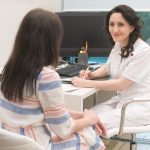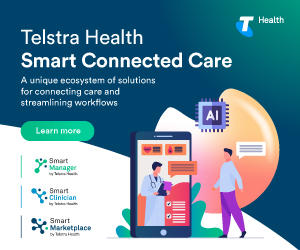What does a doctor do in a day?
A career as a health professional can be both rewarding and challenging, and a day in the life of a doctor can be incredibly varied and intense.
MedicalDirector’s Chief Clinical Advisor and GP, Dr Charlotte Middleton, reveals what her typical day working as a doctor is like from morning until night.
A typical day in the life of a GP
8am: Run to the next door café for that life essential coffee that gets me through the morning. I then run back to my consult room to check up on test results and complete any administrative work.
8-9am: Ring patient to confirm positive UTI results and ask receptionists to fax a script for antibiotics. I then complete a referral letter to specialist for urgent review and fax the letter to the specialist.
9am: Despite my best effort to keep the morning running on time, my receptionists manage to corner me and ask me to see a ‘quick fit in’ – a middle-aged woman who thinks she has pneumonia. It turns out to just be mild upper respiratory tract infection, but then on the way out decides to mention the chest pain she has been experiencing recently…
9am-Lunchtime: Already off to a late start, my morning is filled with a range of health issues – confused elderly, anxiety, earache, depression, sinusitis, anxiety and depression, suspected finger fracture, vomiting and diarrhoea, BP scripts, mastitis, discussion of results (called in via our recall system), a fall due to alcohol intoxication, an overdue pap smear (called in via our reminder system), travel health advice, STD check and then finally, the excision of a large piece of glass deep in a tradies knee (which has been there for weeks and festered nicely).
Lunch: Just about to go to lunch when the nurse grabs me to see someone in the treatment room short of breath. It is now almost time to start my afternoon list. I grab lunch on the go while catching up on my notes from the morning. Ring gastro to ask for urgent appointment for a young girl with suspected coeliac. Discuss with endocrinologist recent thyroid results on a complex patient.
1:30pm-5pm: Start the afternoon appointments with a drivers licence medical; recovering breast cancer, new breast cancer, dog bite, 12-month immunisations, care plan preparation and physio referral, rash on a baby (who I end up sending to emergency), anxiety, back pain, pain med scripts and discussion why we need to reduce said pain meds, a wound review in the treatment room, counselling a grieving widow, discussion around an INR result and warfarin dosing and tonsillitis. I then end the day on a high, with the news that one of my patients, who has been trying for a baby for years, is finally pregnant via IVF treatment.
5pm-7pm: Spend the next few hours checking results, calling patients to discuss some of these results and fax referral letters and scripts. Catch up on messages and make notes on what needs to be done the next day.
7pm: I finally down tools around 7pm and drive home to my beautiful family. I put the kids to bed and then sit back down at my computer and dial in remote access to finish checking results and complete patient notes for a further 90 minutes, before conceding defeat and heading to bed.
Too much to do in too little time? You’re not alone
It’s not surprising when you look at a typical day in the life of a doctor, where I’ve seen 32 patients, spoken on the phone to another 10, spoken to a number of specialists, faxed numerous referrals and scripts and spent hours checking results and catching up on admin, that so many GPs are suffering from stress and burnout.
And while I may only be one voice in the industry, I know that most doctors share in the constant stress of more often than not running late, keeping patients waiting, but having to be 100% on your game for each and every one of them. The pressure of administrative work and how to fit it all in is never ending.
But having said all that, I love what I do. A career as a doctor is equal measures stress, frustration, worry, laughter, satisfaction and happiness.
I feel extremely blessed to be able to do the work I do, to get to know intimately my patients and their families – and to make a difference in their lives.
Taking time to identify the inefficiencies
Looking back at my day, I can see how technology can help save time and give me back more precious hours in the day. For instance:
- Electronic drug alerts could quickly stop me ordering medication not appropriate for my pregnant patient – or automatically alert me to any contraindications to medications my patient with BP is taking.
- Being able to easily and effortlessly print or email factsheets, embedded in the software could allow for quicker communication, improved patient knowledge, better compliance and patient satisfaction.
- Immunisation records that are up to date ensure the appropriate vaccine is given.
- Clinical prompts, suggesting patient supports groups, or treatment considerations based on data analytics, could have a meaningful impact on my patients health – in ways that I might not have otherwise thought of.
- The recall and reminder systems that have called my patients in could mean the difference between an early diagnosis that is treatable, rather than something more sinister if left too late.
- Easy to complete, efficient and intuitive care plans and letter writer templates could help keep my work day flowing better and keep my stress at bay
- Ordering results that are quick and easy with the ability to have things like pathology favourites could be another great time saver
- Accessing my patient files via the cloud – wherever I might be at work, home, at the kids swimming lessons and more, could mean I can have a better work-life balance.
- Knowing online appointments, billing and batching systems all work efficiently and that the reception staff and practice manager are happier for it – can change the whole office dynamic for the better and influence care at every level.
I could go on and on. But the point I want to make is that each day in the life of a doctor is never the same, but the routines, systems, tools, resources and technology we use in our medical practice should be consistent and reliable – they are there to make our life easier, not harder. Even small improvements can significantly improve those moments of patient care, along with our ability to truly enjoy what we do as medical professionals – and how we do it.
So whether you’re thinking about a career as a doctor, or are a GP who just wants to know you’re not alone in the pressures you face everyday, what I can say is that when it comes to being the ‘best’ doctor you can be, the ‘ideal’ is the best of you, in the best of circumstances, with the best of tools.









